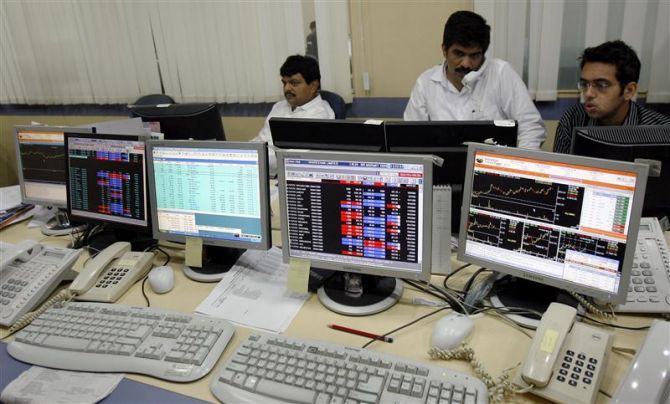Projections from individual companies, analysts and from industry bodies indicate that earnings growth will not pick up in the first half of 2015-16.
 India's stock markets saw on Wednesday their largest single-day losses of 2015.
India's stock markets saw on Wednesday their largest single-day losses of 2015.
Even smaller stocks lost ground; and the rupee also saw losses.
Clearly, multiple factors were driving this - but above all, investor optimism has suffered because expectations of fast reforms have been belied.
In addition, tax demands on large companies and foreign investors that are widely seen as being retrospective have led to a familiar and widespread distrust of the policy regime.
As a result of the disenchantment, foreign institutional investors have sold over $2 billion-equivalent of Indian equity in the past fortnight.
Several external factors now conspire to make Indian assets look less attractive.
Global growth is slowing, with the United States and China reporting first-quarter (January-March 2015) deceleration.
Coupled with an over-valued rupee, this means lower demand for India's exports. Meanwhile, crude oil prices have gained 50 per cent over the January 2015 levels.
If crude oil continues to rise, a larger current account deficit will be on the cards and the government will also need to revisit its fuel and fertiliser subsidy assumptions.
On the domestic front, the flow of full-year financial results has been disappointing so far, with many companies under-shooting consensus expectations.
Core sector data indicate that those eight key industries (which have a combined weight of about 38 per cent in the Index of Industrial Production) grew at just 3.5 per cent in 2014-15.
That is the lowest core sector growth rate registered in the last decade. Even services are slowing, since the HSBC Services Purchasing Managers' Index hit a three-month low in April.
Many large infrastructure projects still remain stalled. Banks and non-banking finance companies are struggling with a huge overhang of sticky debt from those projects.
Projections from individual companies, analysts and from industry bodies indicate that earnings growth will not pick up in the first half of 2015-16.
Private investment is likely to be muted, given low demand and surplus capacity.
A poor monsoon is also likely.
That could hurt rural demand and trigger higher food inflation. Fears of the latter may induce the Reserve Bank India to exercise caution and maintain status quo on policy rates.
Stock market indices are below their respective 200-day moving averages - often a sign of a long-term bearishness and an indication of a change of global mood on India.
Equity returns for 2015 are into negative territory.
Corrections can, in themselves, create a negative feedback loop, generating more pessimism.
A bear market will make the Budget's projections of Rs 69,500 crore from public sector disinvestment unlikely - which could mean a higher fiscal deficit.
The first year of the new government and its first full-year Budget indicated that the National Democratic Alliance would prefer to tread the path of incremental reform.
But that assumed that the global environment would remain benign and investment would continue to flow in from overseas.
If the external environment does turn adverse and overseas investment heads elsewhere, this process may be too slow.
There is a straightforward equation underlying the electoral mandate of May 2014. Millions of young Indians enter the workforce every year.
The economy must grow at a rate that generates employment for them. Voters hoped the Bharatiya Janata Party could accomplish this task and do it quickly.
By not being able to adopt a more aggressive approach during its honeymoon period, the government might have missed its best opportunity.
It will now have to think hard on what it needs to do to revive the investment cycle.
Photograph: Reuters









